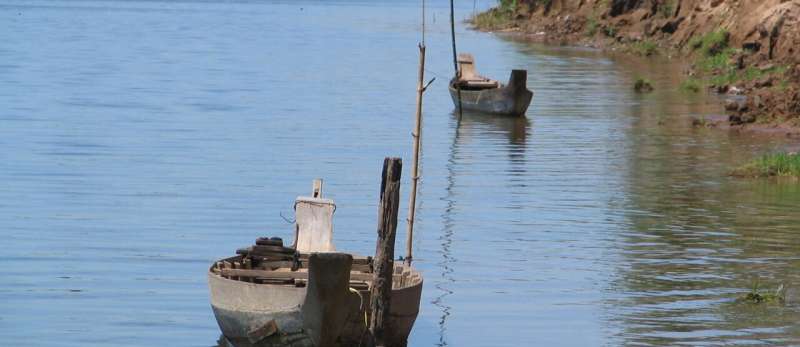Changing climate increases the need for water diplomacy

Water diplomacy means that water must be diplomatised and diplomacy watered.
This is how Professor Marko Keskinen from Aalto University sums it up, with a smile. Keskinen studied different aspects of water diplomacy together with Erik Salminen and Juho Haapala. The study was recently published in the Journal of Hydrology.
Finland is known for its active role in promoting transboundary water cooperation: both UN Conventions on the theme have been initiated by Finland and the country has supported transboundary cooperation, e.g. in the Nile, Central Asia and the Mekong. The topic is also relevant on a practical level through Finland's cooperation with Russia on the river Vuoksi, which Aalto researchers have examined in co-operation with the University of Eastern Finland. Vuoksi runs over 160 km from Lake Saimaa in Southeastern Finland to Lake Ladoga in what is now Russia.
"Vuoksi is a great example of how the countries that have been in violent conflict can establish well-functioning water cooperation through a step-by-step process that combines technical and political expertise. Vuoksi became a border river only after Finland lost vast land areas to the Soviet Union after World War II—the starting point for the co-operation was thus very tense. Thanks to the combination of strong political commitment, practical collaboration and progressive treaties, however, co-operation on Vuoksi is now seen as one of the best-functioning in the world, and the key principles have remained unchanged through, among other things, the collapse of the Soviet Union," says Keskinen.
A prominent example of the need for water diplomacy can be found from the Blue Nile in Africa, where the giant hydropower dam being built by Ethiopia has increased tensions with downstream Sudan and Egypt.
According to Keskinen, the situation on the Nile shows why transboundary cooperation based on technical information alone doesn't always suffice. The countries share largely the same understanding about the dam and its downstream impacts, but the dispute is about much more than water: it involves agriculture, energy as well as the dynamic geopolitical relations in the region. Future uncertainty brought by climate change further challenges negotiations.
"The diplomatisation of water means that water cooperation should be connected to other key sectors as well as political relations between countries and, if necessary, seek a solution at a broader political level with the help of diplomatic mechanisms. The watering of diplomacy, on the other hand, emphasizes joint technical knowledge base and the importance of building the countries' relations on the established international principles on shared waters," he explains.
From conceptualisations to action
In the article, Aalto's researchers recognize five key aspects for water diplomacy and suggest a new approach for recognizing practical water diplomacy approach. The research builds on extensive literature review as well as series of workshops and interviews among water diplomacy actors.
"Conventionally, water diplomacy is seen to bring together two main tracks: technical and political. We develop this further, suggesting that the technical foundation and political roof are connected by three pillars that emphasize preventive, integrative and cooperative aspects that are present in most water diplomacy processes," says Keskinen.
Researchers at Aalto University have played an important role in promoting water diplomacy also at practical level. Aalto cooperates closely with the Finnish Ministry for Foreign Affairs, and the two water diplomacy surveys carried out by Aalto have guided the work of the Finnish water diplomacy network coordinated by the Ministry.
Keskinen, who has also worked at the Foreign Ministry, says that while politics often emphasize common interests and joint benefits of regional cooperation, the countries' own, differing interests and the need to emphasize sovereignty may undermine cooperation. In such situations, water diplomacy may benefit from the participation of a third party—and that party cannot shy away from tensions, either.
"Our approach notes the inherent tensions that exist in many transboundary contexts, and establishes undesired future conflict paths that such tensions may lead to—unless preventive action is taken. In some situations, we suggest that this kind of "what if" thinking may increase both the creation and, importantly, motivation for novel solutions," says Keskinen.
In the case of the Nile, such a novel solution could mean establishing a compensation mechanism where the downstream needs are systematically taken into account in the dam operation, and downstream countries compensate the losses that this causes to the electricity production.
Climate change intensifies the pressure on water resources, causing uncertainty as well as increasing floods and droughts. This is also reflected in transboundary river basins, as countries seek new ways to ensure water security—for example with the help of large dams. Such pressures mean that the need for water diplomacy in the world is likely to increase in the future.
There are already increasing signs of interest towards water diplomacy. The EU Council Conclusions in 2018 emphasized water diplomacy's role in the EU's foreign policy and development cooperation. In Finland, the recently established Centre for Peace Mediation at the Ministry for Foreign Affairs has water diplomacy as one of its thematic focus areas.
"It is wonderful to see that an organization that is not in any way water-oriented understands the central importance of water for peace," says Keskinen.
More information: Marko Keskinen et al, Water diplomacy paths – An approach to recognise water diplomacy actions in shared waters, Journal of Hydrology (2021). DOI: 10.1016/j.jhydrol.2021.126737
Provided by Aalto University



















